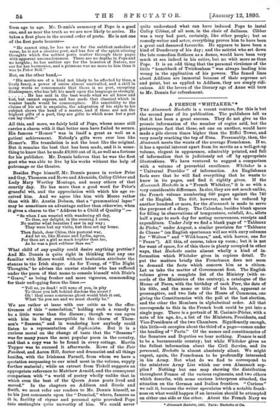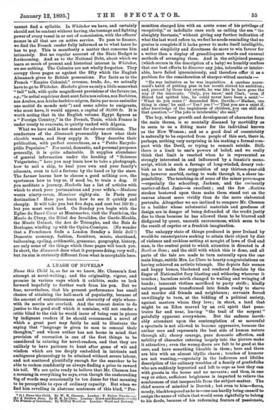A FRENCH " WHITAKER."*
THE Abnanach Hachette is a recent venture, for this is but the second year of its publication. The publishers tell us
that it has been a great success. They do not give us the prosaic information of the number of copies sold, but the picturesque fact that these, set one on another, would have made a pile eleven times higher than the Eiffel Tower, and very nearly reaching the top of Etna. Presumably, then, the Abnanach meets the wants of the average Frenchman. If so, it has a special interest apart from its merits as a well-got-up volume, elegant in appearance, admirably printed, and full of information that is judiciously set off by appropriate illustrations. We have ventured to suggest a comparison with a volume of proverbial excellence. Whitaker is a "Universal Provider" of information. An Englishman feels sure that he will find everything that he wants to know in its pages, and find it rightly given. If the Abnanach Hachette is a "French Whitaker," it is so with a very considerable difference. In size, they are not much unlike, the French volume numbering 640 pages against the 740 of the English. The 610, however, must be reduced by another hundred or more, for the Abnanach is made to serve the purposes of a diary. The Calendar, besides blank spaces for filling in observations of temperature, rainfall, &c., allots half a page to each day for noting occurrences, receipts and expenditure. Under July we find a blank page of "Tableaux de Peche," under August, a similar provision for "Tableaux de Chasse" (an English sportsman will see with envy columns for " Wolves " and "Wild-boars," and, with horror, one for "Foxes"). All this, of course, takes up room ; but it is not for want of space, for of this there is plenty occupied in other ways, that Hachette omits almost wholly a kind of in- formation which Whitaker gives in copious detail. To put the matters briefly the Frenchman does not seem to demand the facts which concern him as a citizen. Let us take the matter of Government first. The English volume gives a complete list of the Ministry (with re- cords of the Ministries of the century), a catalogue of the House of Peers, with the birthday of each Peer, the date of his title, and the name or title of his heir, apparent or presumptive, and two lists of the House of Commons, one giving the Constituencies with the poll at the last election, and the other the Members in alphabetical order. All that corresponds to this in the French book could be put into a single page. There is a portrait of M. Casimir-Perier, with a note of his age, SLe., a list of the Ministers, Presidents, and Vice-Presidents of the two Chambers. Significantly enough, this little—it occupies about the third of a page—comes under the heading of "Paris." Of the names and constituencies of the Senators and Deputies we hear nothing. France is said to be a bureaucratic country ; but while Whitaker gives us the fullest information about the Civil Service, and its personnel, Hachette is almost absolutely silent. We might expect, again, the Frenchman to be profoundly interested in his Army. But what do we find to correspond to the miniature Army List which our own Almanack sup- plies ? Nothing but one map showing the distribution throughout France of the various regiments, and two others which describe, with some curious letterpress attached, the situation on the German and Italian frontiers. "Curious" we call it, because the writer speculates with a notable frank- ness on what would happen if an invasion should be attempted on either one side or the other. About the French Navy we
• Almanach Hachette, 1895. Paris: Hachette et Cie.
cannot find a syllable. In Whitaker we have, and certainly should not be content without having, the tonnage and fighting power of every vessel in or out of commission, with the officers' names in all that are on active service. To pass to finance, we find the French reader fully informed as to what taxes he has to pay. This is manifestly a matter that concerns him intimately. But no regular account of the State Budget is forthcoming. And as to the National Debt, about which we learn so much of present and historical interest in Whitaker, we see nothing. The Colonies are not wholly forgotten. They occupy three pages as against the fifty which the English Almanack gives to British possessions. For facts as to the French "Empire Colonial," revenue, trade, &c., we actually have to go to Whitaker. Hachette gives us only a little somewhat " tall" talk, with quite magnificent previsions of the future (as, e.g., "le metal superieur dont sont faits nos colons, nos Berberee, nos Arabes, nos Arabo-berbero-negros, finira par none assimiler tine moitie du monde noir ") and some advice to emigrants, who must have, it would appear, a capital of 30,000 fr. It is worth noting that in the English volume Egypt figures as a "Foreign Country," in the French, Tunis, which France is under treaty to evacuate, is quietly ranked with Algeria.
What we have said is not meant for adverse criticism. The conductors of the Almanach presumably know what their clientele wants, and they supply it. They describe their publication, with perfect correctness, as a "Petite Encyclo- pedie Popnlaire." For social, domestic, and personal purposes generally, it is quite admirable. It supplies abundance of general information under the heading of "Sciences Vulgarisees; " here you may learn how to take a photograph, how to sail a ship, to heal your own and your family's ailments, even to tell a fortune by the hand or by the stars. The farmer learns how to choose a good milking cow, the sportsman how to buy or, if need be, to train a dog. If you meditate a journey, Hachette has a list of articles with which to stock your portmanteau and your wife's,—.Madame wants ninety-seven, Monsieur eighty-six. Is Paris your destination ? Here you learn bow to see it quickly and cheaply. It will take you but five days, and cost but 100 fr. ; but you must work hard. On Sunday you begin with the Eglise du Sacre.Cceur at Montmartre, visit the Pantheon, the Musee de Cluny, the Hotel des Invalides, the Garde-Meuble, the Musee Guirnet, the Arc de Triomphe, and the Bois de Boulogne, winding up with the Opera-Comique. (No wonder that a Frenchman finds a London Sunday a little dull !) Domestic economy, fashion, furniture, music, shorthand, ballooning, cycling, arithmetic, grammar, geography, history, are only some of the things which these pages will teach you. In short, the Almanach does what it purposes doing, very well ; but its aim is curiously different from what is acceptable here.



































 Previous page
Previous page